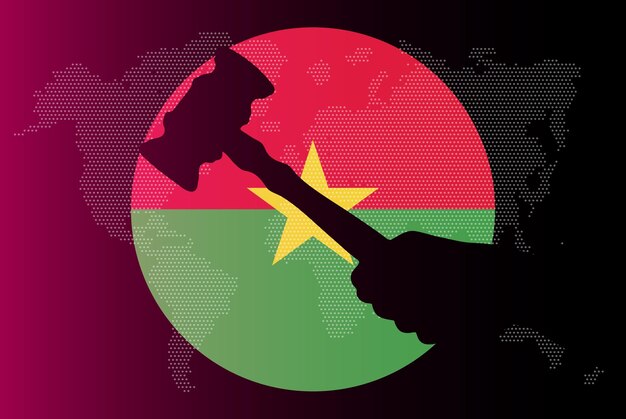
by Zainab Pieh
In 2023, Burkina Faso’s former transport minister was sentenced for embezzling public
funds, a rare conviction in a country where corruption has long undermined public trust. Vincent
Dabilgou, who served from 2018 to 2022, was found guilty of siphoning over 1.1 billion FCFA
($1.7 million), money laundering, and illicitly financing his political party. While this may seem
like progress, it’s just the tip of the iceberg. Beneath the surface lies a procurement system where
bribes, opaque budgets, and political favors run unchecked, weakening institutions and stealing
opportunity from everyday citizens.
Public procurement is the government’s process of purchasing goods and services, and
should be a tool for domestic growth. But Burkina Faso has become a hotbed for corruption and
mismanagement. According to Transparency International’s 2024 Corruption Perceptions Index,
Burkina Faso scored 41 out of 100, ranking 82nd out of 180 countries, only sly above the
sub-Saharan African average of 33. Nearly 16% of public service users reported paying bribes in
the previous year, and over a quarter of citizens believe corruption has increased. Tens of
millions of dollars are diverted each year, draining the economy and deepening inequality.
Corruption erodes trust, undermines public services, and distorts fair competition within the
private sector. It does not just break laws, it breaks lives.
Within Burkina Faso, there are intense hidden costs of corruption. With over 74% of
public sector employment in Burkina Faso occurring within informal structures, making
oversight difficult and corruption easy to hide. These shadowy networks lead to:
● Inflated procurement costs
● Unfair advantages for politically connected firms
● Fewer resources for essential services like healthcare, education, and infrastructure
When these public contracts are awarded based on bribes instead of merit, everyone pays the
price, especially citizens who depend on reliable, functional government services.
Identifying the corruption is only the first step. The real challenge lies in dismantling the systems
that enable it. Burkina Faso’s history is marked by entrenched patronage networks and a culture
of impunity, particularly under former President Blaise Compaoré, whose regime was notorious
for embezzlement and political repression. In Burkina Faso, reforming public procurement
requires bold, measurable action that restores transparency, accountability, and institutional trust.
While the problem is complex, Burkina Faso can begin to rebuild its procurement system from
the inside out.
One powerful reform tool that can be implemented is budget codes. These alphanumeric
sequences categorize expenditures clearly, tracking where public money is going and who is
accountable for its movement.
An example of a budget code and its breakdown is showcased below:
PW-STR-M-2025-
PW= Public Work
STR= Street Maintenance
M= Materials
2025= Budget Year
By enforcing the use of these codes across agencies, it would allow ARCOP (Burkina Faso’s
procurement authority) can audit the spending, as well as detect anomalies, and ensure
transparency. Countries that have implemented similar systems have seen dramatic
improvements in accountability and resource efficiency.
The usage of budget codes will require a remake of the system, and, as a nation within the
developing world, assistance is necessary. Burkina Faso’s budget transparency score is 4.43 out
of 10, indicating significant room for improvement. Too pattern for progress, Burkina Faso
doesn’t need to tackle corruption alone. A Memorandum of Understanding (MOU) with the
OECD would bring the country into a powerful international framework of anti-bribery
standards.
The OECD’s Working Group on Bribery has helped over 35 countries strengthen their
procurement systems. Through an MOU, ARCOP could potentially:
● Access best practices and technical support
● Gain international credibility
● Hold both domestic and foreign contractors to higher ethical standards
This partnership would help insulate the procurement process from political interference and
provide a blueprint for long-term reform.
It is safe to assume that these solutions won’t be easy to implement. Budget transparency
requires strong data systems and political backing. International partnerships require diplomacy
and trust. And yes, entrenched elites who benefit from corruption will likely resist. But the cost
of maintaining the status quo is far worse: lost funds, weakened institutions, and increased
instability. The 2020 coup in Burkina Faso, while not directly caused by defense embezzlement,
was fueled by widespread mismanagement and public frustration – much like what we’ve seen in
neighboring Mali and Niger.
Fighting corruption is about more than chasing criminals. It’s about building institutions that
serve people, not politicians. With transparent budgeting tools and stronger international
cooperation, Burkina Faso can chart a new path rooted in trust, accountability, and sustainable
development. These reforms won’t just strengthen procurement – they’ll help restore confidence
in democracy itself.
Zainab Pieh is a School of Diplomacy student who participated in the UN Field Seminar course in the Spring 2025 semester.